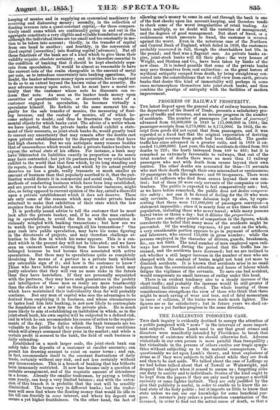PROGRESS OF RAILWAY PROSPERITY.
THE latest Report upon the general state of railway business, from the department of the Board of Trade, presents a satisfactory pro- gress of traffic and revenue, and an inverse progress in the number of accidents. The number of passengers [or rather of journeys] advanced from 63,000,000 in 1849 to 111,000,000 in 1854; the passenger-receipts from 6,278,000/. to 9,175,000/. In 1852, the re- ceipt from goods did not equal that from passengers, and it was. regarded as a fixed fact that the original expectation of deriving the principal revenue from goods had been falsified. The goods- traffic has since advanced in a greater ratio, and in 1854 it ex- ceeded 11,000,000/. Last year, the fatal accidents declined from 306 deaths to 223; the hurts increased from 449 to 453; but it is remarked as extremely favourable to railways, that out of the total number of deaths there were no more than. 12 railway passengers who met with death from causes beyond their own control. The other deaths are accounted for thus-73 servants- who met their death through their own misconduct or carelessness; 19 passengers in the like manner ; and 80 trespassers. There were indeed 51 sufferers who died from causes beyond their own con-- trol ; but of these 39 were only servants of the companies or con- tractors. The public is expected to feel comparatively sake; but, as we have before remarked, the public does not desire compara- tive safety ; nor can it be devoid of feeling for the 39 who were only servants. There is some delusion kept up also, by repre- senting that there were 111,000,000 of passengers conveyed—a statement impossible ; since it is nearly four or five times the total population, including those who never travel; while many persons travel twice or thrice a day. : but it dilates the proportions. There are some other points of comparison in the figures, which. corroborate the belief that many more of the accidents might be prevented. Of the working expenses, 45 per cent on the whole, a very considerable portion appears to go in payment of artificers and labourers, who exceed 135,000 in gross number; while the persons employed in the character of drivers, guards breakamen, ere., are not 9500. The total number of men employed upon rail- ways has increased duringthe period that the traffic has in- creased, and the accidents have decreased; but we are inclined. to ask whether a still larger increase in the number of men who are charged with the conduct of trains might not tend yet more to diminish accidents. It is known that accidents arise in no small degree from the overstrained attention and hours of labour which. fatigue the vigilance of the servants. To save one bad accident, would compensate no small increase of outlay under this head. There is an evident tendency also to a steady increase of the short traffic; • and probably the increase would be still greater if additional facilities were offered. The whole bearing of these considerations strengthens the view of those who think that there might be much saving of wear and tear, and of fatal momentum in cases of collision, if the trains were made much lighter. The figures are so far satisfactory ; but in future years we shall ex- pect to see a yet further progress in the same direction.


























 Previous page
Previous page